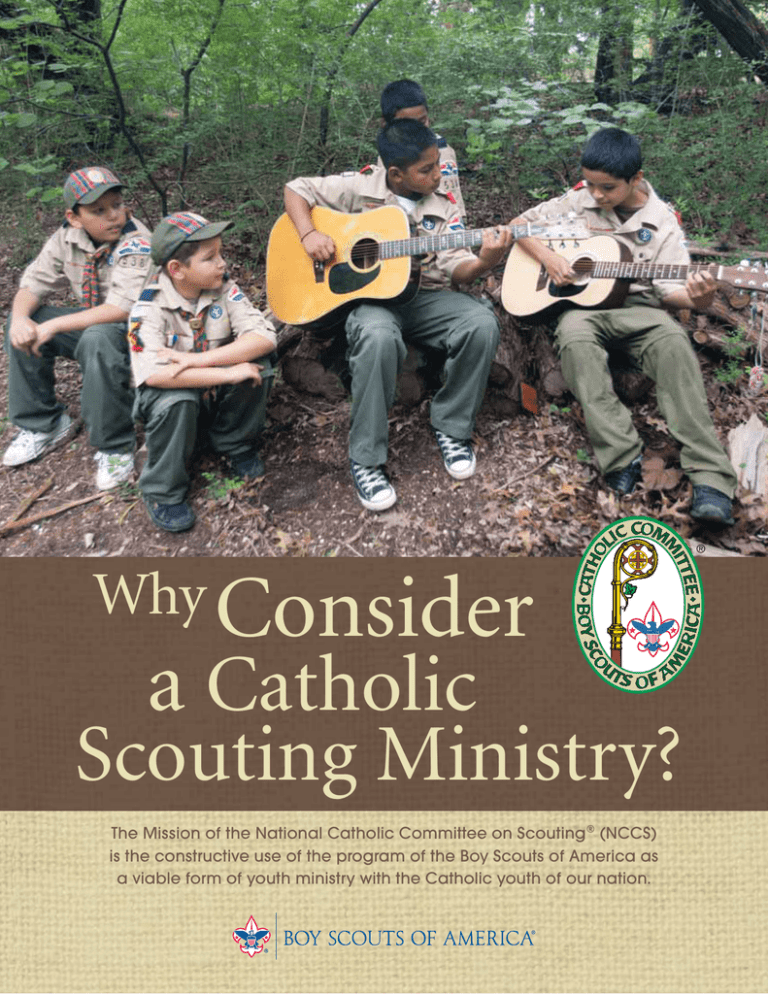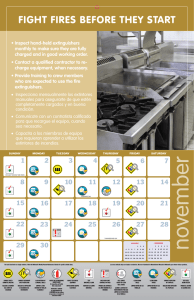a Catholic Scouting Ministry? - National Catholic Committee on
Anuncio

® Why Consider a Catholic Scouting Ministry? The Mission of the National Catholic Committee on Scouting® (NCCS) is the constructive use of the program of the Boy Scouts of America as a viable form of youth ministry with the Catholic youth of our nation. Scouting Forms Christian Leaders By Bishop Robert E. Guglielmone Bishop Liaison, National Catholic Committee on Scouting Over 100 years ago, a program developed in England to assist boys in the process of growing up, was introduced in the United States. As time went on, the Boy Scouts of America became much more than a program; it evolved into a movement that would eventually affect the lives of millions of boys as they advanced in age and maturity. Scouting, with its inherent value system, came to be recognized as a powerful educational process that touched many aspects of a young man’s life and gave him tools that continued to be useful well into adult life. Within the first five years of Scouting’s existence in our county, a Catholic bureau for Scouting was established and a few years later, the first Catholic Committee on Scouting was created. Early on, the connection between Scouting and the Catholic Church was recognized, and it was not long until a formal agreement between America’s Catholic Bishops and the BSA was begun. That relationship has existed now for more than 75 years and has proven to be quite beneficial for both the BSA and the Catholic Church. Through a beautiful cooperative spirit and a well-executed relationship, the church has been able to utilize this wonderful movement to offer a viable youth ministry to our youth through manifold Scouting experiences. In the second half of the last century, the Scouting programs were open to young women, first in the Exploring programs, and more recently with Venturing crews. In these difficult times for our young people, the aspects of self identity, confidence, and Christian leadership are all objects for growth in an environment that is wholesome, safe, and effective. The ideals of Scouting fit perfectly with the goals of Catholic education and formation. The love and respect of the outdoors and all of God’s creation are a major priority for Scouting; peer education and leadership development flourish in its powerful programs; faithful and responsible citizenship are constantly presented and encouraged; respect for all people and appreciation for cultural interaction abound; churches and religious groups have real opportunities to catechize Scouts of their own faith through the very effective religious emblems programs. In addition to all of this, Scouting provides the opportunity for strong adult role models in both its adult leadership opportunities and the possibilities of developing good healthy adult friendships. The many religious programs offered by the National Catholic Committee on Scouting are valuable tools in the work of vocations to priesthood and religious life. A large percentage of our current seminarians were Scouts; many are Eagle Scouts. We, as Catholics, are blessed to have this magnificent youth ministry program that we may utilize in so many ways. Support Scouting! Develop a parish pack, troop, or crew. Many of our Catholic young people are already involved, and many more could be. Wouldn’t it be great if every parish could boast of at least one Scouting unit? Even greater if parishes would charter all three levels! God Bless! In the Lord’s peace, Nine Reasons to Consider a Scouting Ministry 1 2 3 4 5 Intentional Ministry Scouting can be an effective, intentional outreach ministry of the parish, school, Knights of Columbus Council, or other Catholic organization. Evangelism Reaching youth and their families through Scouting provides an opportunity to introduce, nurture, and build a relationship with Jesus Christ. Service to Your Members There are many Catholic youth who will richly benefit from the Scouting program. Scouting will enhance your existing youth programs and help you better serve your members. Proven Youth Program Since 1910, the BSA has provided strong, value-based programs that strengthen character, develop good citizenship, and enhance both mental and physical fitness in youth—traits that prepare young people to make the best decisions for today and tomorrow. It’s Your Program The BSA grants a charter to your church or school, and you operate the program in conjunction with your church’s special needs, desires, and objectives. 6 7 8 9 Leadership Training Scouting has highly developed leadershiptraining programs for youth and adult members. The benefits of these training programs can positively affect other areas of your church and its ministry. Outdoor Resources Boy Scout councils maintain camps for the exclusive use of their members. In addition to camps, many have high-adventure bases and specialized outdoor gear such as canoes, kayaks, and whitewater rafts available for use. “Duty to God” The religious emblems program is available to all Cub Scouts, Boy Scouts, and Venturers, allowing them age-specific ways to deeply serve their faith and congregations. Community Service Scouting emphasizes “helping other people at all times.” Your church’s Scouting ministry will promote spiritual growth and lead youth to be faithful in service to God and their neighbors. Cub Scouting Cub Scouting has distinct, age-appropriate program levels. Tiger Cubs is a one-year program for first grade (or 7-year-old) boys and their adult partners. The Cub Scout program is for boys who are in the second and third grades (or ages 8 and 9). The Webelos Scout program is for boys who are in fourth or fifth grade (or age 10). Cub Scouting is: • Home-centered and family building. • Filled with fun, action, and adventure to help build fitness, character, and good citizenship traits in boys through family emphasis. • A boy’s first experience in growing up as a member of a group. Purpose The Boy Scouts of America created Cub Scouting in 1930 to help advance the character development and spiritual growth of young boys. This central mission of Cub Scouting might be even more important to boys growing up in the 21st century than it was for those early Cub Scouts more than 80 years ago. Program Local Cub Scouting activities involve parents, adult leaders, and friends of Cub Scouts in homecentered programs that teach life skills, habits, values, and attitudes consistent with the interests of their faith and community. Millions of boys and their families participate in Cub Scouting, which is the largest of the three BSA membership divisions. Methods Cub Scouting encourages each boy to strive for his personal best, a lesson that will help him achieve success as he enters Boy Scouting—and throughout his adult life. Cub Scouting activities encourage character development, physical coordination, family unity, and enthusiasm for learning. Cub Scouting helps boys develop a sense of teamwork, achievement, self-confidence, and respect for others. Learning to master new skills helps the Cub Scout realize his own abilities and discover that his can-do attitude is the first sign of success in any endeavor. In fact, that’s the Cub Scout motto: Do Your Best. Boy Scouting Boy Scouting is for boys who are at least 10 years old and have completed the fifth grade or are 11 through 17 years old. Boy Scouting is: • Filled with troop and patrol activities designed to help build personal skills, teamwork, and leadership. • An action-packed way to teach leadership, service, and respect for others. • Adventure and fun outdoor experiences under the guidance of adult leaders. • A program that provides plenty of opportunity for individual growth at a boy’s own pace. Purpose Boy Scouting encourages boys to develop physical, mental, and emotional fitness and to adopt and live by meaningful personal standards as a cornerstone for success in life. These values service, fitness, and social activities under the guidance of experienced adults. • A great way for young men and women to learn leadership and problem-solving skills that will help them to mature into confident, successful adults. Purpose include the basic principles found in the Scout Oath and Scout Law. Venturing is an effective coed young-adult program designed to improve character, citizenship, and fitness through positive experiences and activities which prepare them to become responsible and caring adults. Program Program Boy Scouts learn to develop personal strengths by example and through hands-on experience. Activities include fitness and leadership training, wilderness adventures, and merit badge incentives for boys who master hobby and career skills. Scouting encourages boys to expand and test their personal initiative, courage, and resourcefulness. Venturing is based on a unique and dynamic relationship between youths and adult advisers serving as resources and mentors. The resulting program is filled with exciting and meaningful activities that help youth pursue their special interests: to grow; to develop personal, social, and leadership skills; and to become good citizens. Methods Boy Scouts learn some of life’s more serious lessons while having fun. Boys learn about important values, such as helping oneself by helping others and honoring the basic rights of others. Boy Scouting’s active learning experiences include hiking, camping, and other outdoor expeditions; competitive individual and team sports activities; and community or religious service projects. Many Boy Scouts first practice basic leadership, self-government, and citizenship skills during regular troop meetings and campouts. Venturing Venturing is a youth development program for young men and women ages 14 through 20, or 13 with completion of the eighth grade. Venturing is: • Designed to help meet the needs, wants, and problems of this young adult generation. • A novel program that includes emphasis on outdoor, high-adventure activities, while providing members with community Methods The Venturing program has been carefully designed to achieve the aims of the BSA and meet the needs of young adults. Included in the methods of Venturing are: • Leadership—Opportunities to learn and apply proven leadership skills are provided to the Venturers. • Group activities are interdependent group experiences in which success is dependent on the cooperation of all. • Adult association—Working closely with adult advisors and other adult leaders, the youth officers lead the crew. The adults serve in a “shadow” leader capacity. • Recognition comes through the Venturing advancement program and through the acknowledgement of a youth’s competence and ability by peers and adults. • Ideals—Venturers are expected to know and live by the Venturing Oath and Code. They promise to be faithful in their religious duties, to treasure their American heritage, to help others, and to seek truth and fairness. • High adventure—Venturing’s emphasis on high adventure helps provide team-building opportunities, new meaningful experiences, practical leadership application, and lifelong memories to young adults. • Teaching others—All of the Venturing awards require Venturers to teach what they have learned to others. In so doing, they strengthen their knowledge, gain confidence, and acquire skills that can benefit them for the rest of their lives. A Word About Youth Protection Child abuse is a serious problem in our society, and unfortunately, it can occur anywhere, even in Scouting. Youth safety is of paramount importance to Scouting. For that reason, the BSA continues to create barriers to abuse beyond what have previously existed in Scouting. The Boy Scouts of America places the greatest importance on providing the most secure environment possible for its youth members. To maintain such an environment, the BSA has developed numerous procedural and leadership BOY SCOUTS OF AMERICA National Catholic Committee on Scouting 1325 West Walnut Hill Lane P.O. Box 152079 Irving, Texas 75015-2079 www.nccs-bsa.org www.scouting.org/membership P 972-580-2114 F 972-580-2535 Email [email protected] selection policies, and provides parents and leaders with numerous online and print resources for the Cub Scout, Boy Scout, and Venturing programs. Effective June 1, 2010, the BSA implemented mandatory Youth Protection training for all registered volunteers. New leaders are required to take Youth Protection training before submitting an application for registration. The certificate of completion for this training should be submitted at the time the application is made and before volunteer service with youth begins. Youth Protection training must be taken every two years. If a volunteer does not meet the BSA’s Youth Protection training requirement at the time of recharter, the volunteer will not be reregistered. We encourage all adults to take the BSA’s Youth Protection training. To find out more about the Youth Protection policies of the Boy Scouts of America and how to help Scouting keep your family safe, see the Parent’s Guide in any of the Cub Scouting or Boy Scouting handbooks, or go to http://www. scouting.org/Training/YouthProtection.aspx. la conducta ciudadana y el acondicionamiento físico mediante experiencias positivas y actividades que los preparan para convertirse en adultos respon-sables y comprensivos. Programa Venturing está basado en una relación dinámica y única entre los jóvenes y los adultos consejeros que sirven como recursos y mentores. El programa resultante está lleno de emocionantes y significativas actividades que ayudan a los jóvenes a ir en busca de sus intereses especiales: crecer; desarrollar habilidades personales, sociales y de liderazgo; y a convertirse en buenos ciudadanos. Métodos El programa Venturing ha sido cuidadosamente diseñado para lograr las metas de BSA y para cumplir con las necesidades de los jóvenes adultos. Los métodos de Venturing incluyen: • • • • • • • BOY SCOUTS OF AMERICA National Catholic Committee on Scouting 1325 West Walnut Hill Lane P.O. Box 152079 Irving, Texas 75015-2079 www.nccs-bsa.org www.scouting.org/membership P 972-580-2114 F 972-580-2535 Email [email protected] Liderazgo— a los Venturers se les proporcionan oportunidades para aplicar técnicas de liderazgo comprobadas. Las actividades de grupo son experiencias de grupo interdependientes en las cuales el éxito depende de la cooperación de todos. Asociación con adultos—trabajar de cerca con consejeros adultos y otros líderes adultos, los jóvenes oficiales guían al grupo. Los adultos sirven en calidad de líderes “sombra”. El reconocimiento se realiza mediante el programa de avance Venturing y mediante el reconocimiento de la aptitud y habilidad de un joven por parte de sus compañeros y adultos. Ideales—Se espera que los Venturers sepan y vivan bajo el Juramento Venturing y el Código. Ellos prometen ser fieles a sus deberes religiosos, apreciar su patrimonio nacional, ayudar a los demás, y a buscar la verdad e igualdad. Aventura extrema—El énfasis de Venturing en la aventura extrema ayuda a proporcionar oportunidades de trabajo en equipo, nuevas experiencias significativas, aplicación de liderazgo práctico, y una vida de recuerdos para los jóvenes adultos. Enseñanza a los demás—todos los premios Venturing requieren que los Venturers les enseñen a otros lo que han aprendido. Al hacer esto, refuerzan su conocimiento, obtienen confianza, y adquieren técnicas que les pueden beneficiar el resto de sus vidas. bajo la orientación de líderes adultos. • Un programa que proporciona suficiente oportunidad para el crecimiento individual al propio ritmo del niño. Propósito Boy Scouting anima a los niños a desarrollar buena condición física, mental y emocional y a adoptar y vivir bajo estándares personales significativos como piedra angular para tener éxito en la vida. Dichos valores incluyen los principios básicos que se encuentran en la Promesa y en la Ley del Scout. Scouts practican primero liderazgo básico, autonomía y habilidades cívicas durante las juntas de tropa regulares y campamentos. Venturing Venturing es un programa de desarrollo juvenil para jóvenes de ambos sexos que tienen de 14 a 20 años de edad (y que han completado el octavo grado). • Está diseñado para ayudar a cubrir las necesidades, deseos y problemas de esta generación de jóvenes adultos. • Un novedoso programa que incluye énfasis en actividades al aire libre y de aventura extrema al mismo tiempo que proporciona a los jóvenes miembros servicio comunitario, acondicionamiento físico y actividades sociales bajo la guía de experimentados adultos. • Una gran manera de que los jóvenes de ambos sexos aprendan liderazgo y técnicas para resolver problemas que les ayudarán a madurar y a convertirse en adultos seguros de sí mismos y exitosos. Propósito Venturing es un efectivo programa mixto de jóvenes adultos diseñado para mejorar el carácter, Programa Los Boy Scouts aprenden a desarrollar fortaleza personal mediante el ejemplo y a través de la experiencia en la práctica. Las actividades incluyen entrenamiento físico y capacitación de liderazgo, aventuras en la naturaleza e incentivos con insignias de mérito para los niños que dominen un pasatiempo y habilidades profesionales. Scouting exhorta a los niños a ampliar y a poner a prueba su iniciativa personal, valor e ingenio. Métodos Los Boy Scouts aprenden algunas de las lecciones más serias de la vida mientras se divierten. Los niños aprenden sobre valores importantes, tales como ayudarse a sí mismo al ayudar a los demás y honrar los derechos básicos de los demás. Las activas experiencias de aprendizaje de Boy Scouting incluyen excursionar, acampar y otras expediciones al aire libre; actividades deportivas competitivas individuales y por equipos; y proyectos de servicio religiosos o comunitarios. Muchos Boy Cub Scouting Cub Scouting tiene niveles en el programa específicos según la edad. Tiger Cubs es un programa de un año para los niños en primer grado (o de 7 años de edad) y sus compañeros adultos. El programa Cub Scout es para niños que están en segundo a quinto grado (o tienen 8, 9 ó 10 años de edad). • Se centra en el hogar y en edificar la familia. • Está lleno de diversión, acción y aventura para ayudar a establecer condición física, carácter y buena conducta ciudadana en los niños mediante el énfasis en la familia. Es la primera experiencia de un niño de crecer como miembro de un grupo. • Propósito La organización Boy Scouts of America creó Cub Scouting en 1930 para ayudar a avanzar el desarrollo del carácter y el crecimiento espiritual de los niños pequeños. Esta misión central de Cub Scouting puede que sea incluso más importante para los niños que se desarrollan en el siglo XXI que para aquéllos primeros Cub Scouts de hace más de 70 años. Programa Las actividades locales de Cub Scouting involucran a los padres, líderes adultos y amigos de Cub Scouts en programas con base en el hogar que enseñan habilidades, hábitos, valores y actitudes consistentes con los intereses de su fe y su comunidad. Millones de niños y sus familias participan en Cub Scouting, que es la más grande de las tres divisiones de BSA. Métodos Cub Scouting exhorta a cada niño a luchar por hacer lo mejor que pueda, una lección que le ayudará a lograr el éxito conforme ingresa a Boy Scouting, y a lo largo de su vida como adulto. Las actividades Cub Scouting fomentan el desarrollo del carácter, la coordinación física, la unidad familiar y el entusiasmo por aprender. Cub Scouting le ayuda a los niños a desarrollar un sentimiento de trabajo en equipo, logro, confianza en sí mismos, y respeto hacia los demás. Aprender a dominar nuevas técnicas ayuda a los Cub Scouts a darse cuenta de sus propias habilidades y descubrir que esta actitud de “yo puedo” es la primera señal de éxito en cualquier esfuerzo. De hecho, ese es el lema del Cub Scout: HAZ TU MEJOR ESFUERZO. Boy Scouting Boy Scouting es para niños que tienen por lo menos 10½ años de edad y han completado el quinto grado o tienen de 11 a 17 años de edad. • Está lleno de actividades de tropa y de patrulla diseñadas para ayudar a establecer técnicas y habilidades personales, trabajo en equipo y liderazgo. • Una manera repleta de acción de enseñar liderazgo, servicio y respeto hacia los demás. • Aventura y divertidas experiencias al aire libre Nueve Razones Para Considerar un Ministerio Scouting 1 2 3 4 5 Ministerio Intencional Scouting puede ser un efectivo ministerio intencional de alcance en la parroquia, escuela, Concilio de Los Caballeros de Colón, u otra organización católica. Evangelización Acercarse a los jóvenes y a sus familias mediante Scouting proporciona una oportunidad de presentar, cultivar y entablar una relación con Jesucristo. Servicio a sus Miembros Existen muchos jóvenes católicos que se beneficiarán substancialmente del programa Scouting. El programa Scouting mejorará sus programas juveniles ya existentes y le ayudará a servirles mejor a sus miembros. Programa Juvenil Comprobado Desde 1910, la organización BSA ha proporcionado sólidos programas con base en los valores, que fortalecen el carácter, desarrollan buena conducta ciudadana, y mejoran la salud tanto física como mental de la juventud, rasgos que preparan a los jóvenes a tomar las mejores decisiones para el hoy y el mañana. Es Su Programa La organización BSA le otorga a su iglesia o escuela los estatutos, y usted opera el programa en conjunto con las necesidades especiales, deseos y objetivos de su iglesia. 6 7 8 9 Capacitación de Líderes Scouting tiene programas de capacitación de liderazgo altamente desarrollados para los miembros jóvenes y adultos. Los beneficios de dichos programas de capacitación pueden afectar de manera positiva otras áreas de su iglesia y su ministerio. Recursos al Aire Libre Los concilios Boy Scout mantienen campamentos para el uso exclusivo de sus miembros. Además de los campamentos, muchos tienen bases de aventura extrema y equipo especializado disponible para actividades al aire libre tales como canoas, kayaks y balsas para descenso en ríos. “Deber Hacia Dios” El programa de emblemas religiosos está disponible para todos los Cub Scouts, Boy Scouts y Venturers, permitiéndoles maneras acordes a su edad, de servir profundamente a su fe y congregaciones. Servicio a la Comunidad Scouting hace énfasis en “ayudar a los demás en todo momento.” El ministerio Scouting de su iglesia promoverá el crecimiento espiritual y guiará a los jóvenes para que sean fieles en su servicio hacia Dios y a su prójimo. Scouting Forms Christian Leaders By Bishop Robert E. Guglielmone Bishop Liaison, National Catholic Committee on Scouting Over 100 years ago, a program developed in England to assist boys in the process of growing up, was introduced in the United States. As time went on, the Boy Scouts of America became much more than a program; it evolved into a movement that would eventually affect the lives of millions of boys as they advanced in age and maturity. The love and respect of the outdoors and all of God’s creation are a major priority for Scouting; peer education and leadership development flourish in its powerful programs; faithful and responsible citizenship are constantly presented and encouraged; respect for all people and appreciation for cultural interaction abound; churches and religious groups have real opportunities to catechize Scouts of their own faith through the very effective religious emblems programs. Ne 5 ed / T 1 r 7 a / n 1 s 1 J la t J i o Scouting, with its inherent value system, came to be recognized as a powerful educational process that touched many aspects of a young man’s life and gave him tools that continued to be useful well into adult life. Within the first five years of Scouting’s existence in our county, a Catholic bureau for Scouting was established and a few years later, the first Catholic Committee on Scouting was created. Early on, the connection between Scouting and the Catholic Church was recognized, and it was not long until a formal agreement between America’s Catholic Bishops and the BSA was begun. That relationship has existed now for more than 75 years and has proven to be quite beneficial for both the BSA and the Catholic Church. Through a beautiful cooperative spirit and a well-executed relationship, the church has been able to utilize this wonderful movement to offer a viable youth ministry to our youth through manifold Scouting experiences. In the second half of the last century, the Scouting programs were open to young women, first in the Exploring programs, and more recently with Venturing crews. In these difficult times for our young people, the aspects of self identity, confidence, and Christian leadership are all objects for growth in an environment that is wholesome, safe, and effective. The ideals of Scouting fit perfectly with the goals of Catholic education and formation. In addition to all of this, Scouting provides the opportunity for strong adult role models in both its adult leadership opportunities and the possibilities of developing good healthy adult friendships. The many religious programs offered by the National Catholic Committee on Scouting are valuable tools in the work of vocations to priesthood and religious life. A large percentage of our current seminarians were Scouts; many are Eagle Scouts. n o f C o p y A We, as Catholics, are blessed to have this magnificent youth ministry program that we may utilize in so many ways. Support Scouting! Develop a parish pack, troop, or crew. Many of our Catholic young people are already involved, and many more could be. Wouldn’t it be great if every parish could boast of at least one Scouting unit? Even greater if parishes would charter all three levels! God Bless! In the Lord’s peace, ¿Por qué ® Considerar un Ministerio Católico Scouting? La misión del Comité Católico Nacional de Scouting (NCCS, por sus siglas en inglés) es el uso constructivo del programa de Boy Scouts of America como una forma viable de ministerio juvenil con la juventud Católica de nuestra nación. SKU 522210 New UPC to come-5/17/11 522-210 2011 Printing





